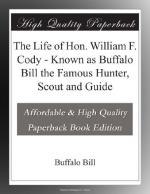The second day that we had been following these Indians we came upon an old squaw, whom they had left on the prairie to die. Her people had built for her a little shade or lodge, and had given her some provisions, sufficient to last her on her trip to the Happy Hunting grounds. This the Indians often do when pursued by an enemy, and one of their number becomes too old and feeble to travel any longer. This squaw was recognized by John Nelson who said that she was a relative of his wife. From her we learned that the flying Indians were known as Pawnee, Killer’s band, and that they had lately killed Buck’s surveying party, consisting of eight or nine men; the massacre having occurred a few days before on Beaver Creek. We knew that they had had a fight with surveyors, as we found quite a number of surveying instruments, which had been left in the abandoned camp. We drove these Indians across the Platte river and then returned to Fort McPherson, bringing the old squaw with us, from there she was sent to the Spotted Tail Agency.
During my absence, my wife had given birth to a son, and he was several weeks old when I returned. No name had yet been given him and I selected that of Elmo Judson, in honor of Ned Buntline; but this the officers and scouts objected to. Major Brown proposed that we should call him Kit Carson, and it was finally settled that that should be his name.
During the summer we made one or two more scouts and had a few skirmishes with the Indians: but nothing of any great importance transpired. In the fall of 1870, while I was a witness in a court martial at Fort D.A. Russell I woke up one morning and found that I was dead broke;—this is not an unusual occurrence to a frontiersman, or an author I may add, especially when he is endeavoring to kill time—to raise necessary funds I sold my race horse Tall Bull to Lieutenant Mason, who had long wanted him.
In the winter of 1870 and 1871 I first met George Watts Garland, an English gentleman, and a great hunter, whom I had the pleasure of guiding on several hunts and with whom I spent some weeks. During the winter I also took several parties out on the Loupe River country, hunting and trapping. Although I was still chief of scouts I did not have much to do, as the Indians were comparatively quiet, thus giving me plenty of time for sporting.
In the spring of 1871 several short scouting expeditions were sent out from Fort McPherson, but all with minor results.
About this time General Emory was considerably annoyed by petty offenses committed in the vicinity of the post, and as there was no justice of the peace in the neighborhood, he was anxious to have such an officer there to attend to the civilians; one day he remarked to me that I would make an excellent justice.
“General, you compliment me rather too highly, for I don’t know any more about law than a government mule does about book-keeping,” said I.




